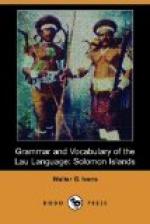Plural:
Inclusive: (1) aga, agolu.
Exclusive: (1) agami, agamelu.
(2) agamu, agamolu.
(3)
agera, ada, adalu.
Dual:
Inclusive: (1) agoro.
Exclusive: (1) agamere. (2)
agamoro. (3) adaro.
The possessive is used:
1. Of things to eat and drink: si fangala agu something for me to eat, o ngalia amu take it for your eating, si doo ana gera priest tafiligera food for the priests only.
When the sense relates to food in general and not to a particular meal the ordinary personal pronouns are employed as possessives: si doo ni gwou inau a drink for me.
2. As meaning, for me, for my part, etc., belonging to, at, with: geni agu a wife for me, nia lea ana he went his way, gu ka gele dau go agu if I but touch, fuana ngalia fera nia agolu to get his land for ourselves, si mamana nia ana power in himself, his power, si doo oro agu I have many things, e langi ana not in it, lost, nia soe agera he questioned them, soea satana ana a doo bago ask so-and-so his name, nia ledia tasi doo agu he asked me about something, ooganga agera their debt.
3. As the object of a neuter verb (i. e., a verb which does not take a transitive suffix): gera da qele ana they marvelled at him, gu ingo amu I beseech thee, dau agu touch me, bota ana blessed is he.
4. With verbs when the object is separated from the verb: nia bubu tete adalu he regarded them fixedly, ka lugatai saufini ana let him go secretly, da bae aisile ana they spoke scornfully of him: ala meme gamu to bite and rend you, is a variant.
5. To express, of, from, among: ati mwane agamu what man of you?
6. The forms ending in lu denote a restriction in the number of the people concerned.
7. The adverb afoa apart is also followed by the possessive: afoa ana apart from him.
8. It will be seen that the one possessive in Lau does the work of the three that are used in Sa’a. A Port Adam man asking for a wife at Sa’a and saying geni ana (as has happened at times) would be asked whether he wanted to eat her—the Sa’a use being keni nana, ’ana being reserved of things to eat.
ADJECTIVES.
1. Words which are qualifying terms may also be used in the form of verbs, but some may be used without verbal particles and follow the qualified word. Mwane baita a big man, mwela tou a little child.
2. Some words have a form which is used only of adjectives, either of termination or of prefix.
a. Adjectival terminations are: a, la.




